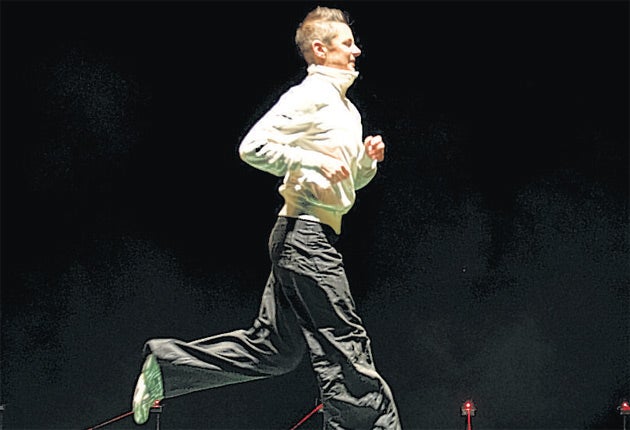The Bobby Sands Memorial Race, The Place, London
Protest piece runs on empty

Bobby Sands died in the Maze prison in 1981, after a hunger strike of 66 days. One of a number of Irish Republicans demanding recognition as political prisoners, Sands was elected as an MP during his strike. The first striker to die, he is the best-known, the most iconic.
Eddie Ladd's performance takes its central image from the fact that Sands was a keen runner – in America, an annual race is held in his memory. Running gives Ladd an image of persistence and endurance. A hunger strike is about refusing to do something; running makes effort visible.
Ladd makes strong use of this image, with terrific, simple stage design. She is less successful in her framing devices, the context she tries to give us about Sands' protest and death.
Ras Goffa Bobby Sands/The Bobby Sands Memorial Race is performed on and around a large running machine, a plain green platform, 12ft by 6ft. Electronic surveillance equipment turns the machine into a cage. Motion-sensor lights create a grid of red light beams inches above its surface. This is a stylised prison.
Ladd, dressed in plain sports gear, lopes around the stage before getting on to the machine. She inches across its surface, not quite able to squeeze under the lines of light. Nick Rothwell's sound system pops and bubbles every time she breaks a surveillance beam, the light flickering green.
Sound is the greatest problem here. There are a lot of voices in this work. Ladd speaks in Welsh and English, describing Sands' life. (The text reflects Ladd's heritage and agenda; at a London performance on an Irish subject, it felt like a different argument.) We also hear readings from Sands' article on running and from his prison writings. Laurence McKeown, another Maze inmate, recounts the prisoners' experiences; the academic Denis O'Hearn describes the H-Blocks. The trouble is, it is hard to hear any of them.
Between Rothwell's soundscape, Guto Puw's music, Ladd's feet and the running machine, the voices are almost drowned out. I heard bits about debate between the protesters, but not about the passing of messages from inside the prison – which Ladd draws on, miming pushing something into her mouth, between her legs.
The movement is strong. Ladd is a wiry, athletic performer, dogged and driven. On the treadmill, she walks until she is forced to run. The machine trips her, pushes her faster than she can go. Ladd uses salt, the one substance the hunger strikers would eat. She pours it on to the machine. As the flat surface moves, her pool of salt becomes a line, then makes a pile on the floor. Later, Ladd dabs at the traces of salt, desperately licking her fingers.
It is an hour-long piece. As time wears on, Ladd staggers, her legs crossing awkwardly. She clutches at her mimed messages, driving herself on. It is a relentless performance; she is evoking Sands' strength of will. Even when she collapses, she inches herself forward. When she comes to a stop, the purring machine tips her gently to the ground.
Join our commenting forum
Join thought-provoking conversations, follow other Independent readers and see their replies
Comments
Bookmark popover
Removed from bookmarks